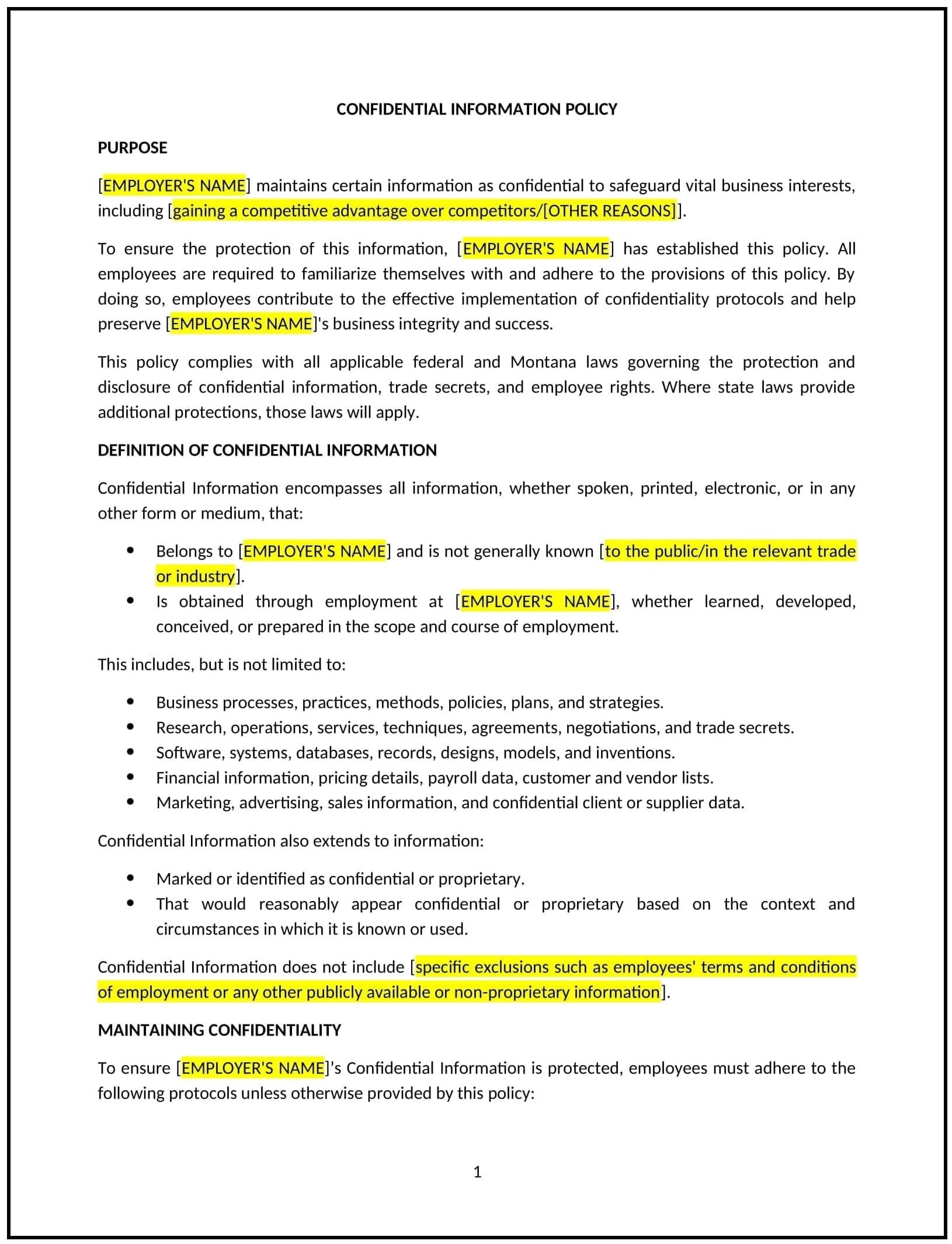Confidential information policy (Montana): Free template
Got contracts to review? While you're here for policies, let Cobrief make contract review effortless—start your free review now.

Customize this template for free
Confidential information policy (Montana)
A confidential information policy helps Montana businesses protect sensitive company data, trade secrets, and employee information. This policy defines what constitutes confidential information, establishes guidelines for handling, storing, and sharing such data, and outlines the consequences for unauthorized disclosure or misuse.
By implementing this policy, businesses can mitigate risks related to data breaches, safeguard intellectual property, and maintain trust with clients, employees, and stakeholders.
How to use this confidential information policy (Montana)
- Define confidential information: Businesses should clearly specify what constitutes confidential information, including proprietary business data, trade secrets, customer lists, employee records, financial information, and any other sensitive material.
- Outline the handling and storage requirements: Businesses should establish guidelines for securely storing confidential information, whether electronically or physically. This includes encrypting digital data, securing physical documents, and limiting access to authorized personnel only.
- Set protocols for sharing confidential information: Businesses should define who is authorized to share confidential information and under what circumstances. Any sharing of confidential information should be on a need-to-know basis and follow company guidelines.
- Address the protection of confidential information during and after employment: Businesses should specify that employees must protect confidential information even after they leave the company and outline the steps to be taken for handling departing employees’ access to sensitive data.
- Define consequences for violations: Businesses should make it clear that any unauthorized disclosure or misuse of confidential information may result in disciplinary actions, including termination or legal action.
- Implement employee training: Businesses should ensure that employees are trained on the importance of protecting confidential information and how to handle it properly.
- Review and update regularly: Businesses should periodically assess the policy to ensure it aligns with current legal standards, business needs, and technological advancements.
Benefits of using this confidential information policy (Montana)
This policy provides several key benefits for Montana businesses:
- Protects sensitive business information: A clear policy helps safeguard valuable intellectual property, financial data, and trade secrets from unauthorized disclosure.
- Reduces legal and financial risks: By establishing clear guidelines, businesses reduce the risk of data breaches, lawsuits, and reputational damage related to confidential information mishandling.
- Fosters employee trust: Employees are more likely to feel secure when they understand how their personal and professional information will be handled and protected.
- Enhances business reputation: Businesses that prioritize data protection build stronger relationships with customers, clients, and partners by demonstrating a commitment to confidentiality.
- Ensures consistent practices: A standardized approach to handling confidential information ensures all employees follow the same procedures, reducing errors or misunderstandings.
- Promotes legal and regulatory compliance: Adhering to confidentiality standards helps businesses meet regulatory requirements and industry best practices.
Tips for using this confidential information policy (Montana)
- Communicate the policy effectively: Businesses should ensure all employees understand the importance of confidentiality and their responsibilities in safeguarding sensitive information.
- Limit access to confidential information: Businesses should restrict access to confidential data to those employees who need it to perform their job functions, reducing the risk of accidental leaks.
- Use technology to protect data: Implement encryption, password protection, and secure data storage systems to protect digital confidential information from unauthorized access.
- Regularly review employee access: Businesses should periodically review which employees have access to sensitive data and adjust access permissions as necessary.
- Provide clear procedures for reporting breaches: Businesses should establish a clear process for employees to report suspected breaches of confidentiality and outline how incidents will be handled.
- Provide ongoing training: Businesses should conduct regular training sessions to remind employees of their confidentiality obligations and address any updates to the policy.